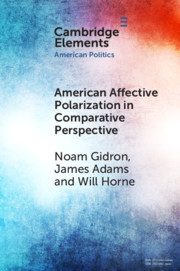Description
American Affective Polarization in Comparative Perspective
Elements in American Politics Series
Authors: Gidron Noam, Adams James, Horne Will
Language: English
Subject for American Affective Polarization in Comparative Perspective:
Approximative price 22.46 €
In Print (Delivery period: 14 days).
Add to cart
Publication date: 12-2020
Support: Print on demand
Support: Print on demand
Description
/li>Contents
/li>
American political observers express increasing concern about affective polarization, i.e., partisans' resentment toward political opponents. We advance debates about America's partisan divisions by comparing affective polarization in the US over the past 25 years with affective polarization in 19 other western publics. We conclude that American affective polarization is not extreme in comparative perspective, although Americans' dislike of partisan opponents has increased more rapidly since the mid-1990s than in most other Western publics. We then show that affective polarization is more intense when unemployment and inequality are high; when political elites clash over cultural issues such as immigration and national identity; and in countries with majoritarian electoral institutions. Our findings situate American partisan resentment and hostility in comparative perspective, and illuminate correlates of affective polarization that are difficult to detect when examining the American case in isolation.
1. Introduction; 2. Affective Polarization in Comparative Perspective: How Does the American Public Compare?; 3. Explaining Variations in Affective Polarization in the United States and Abroad; 4. Conclusions.
© 2024 LAVOISIER S.A.S.




